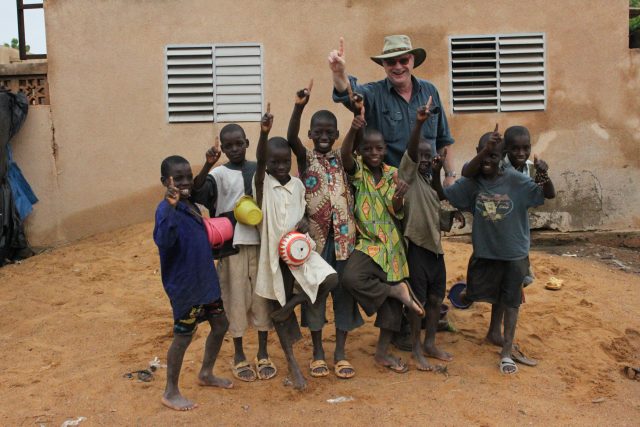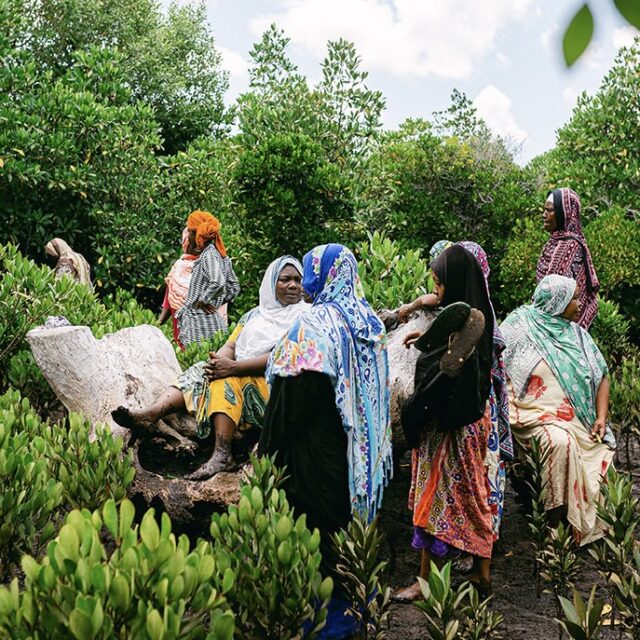This article was originally published in The Times on 22nd July 2016.
Credit: The Times / News Syndication
Charismatic journalist who inspired the rock star Bono to start the ONE campaign against global poverty and became his ‘storyteller’

Michael Elliott with a group of children during a trip to Segou, Mali.
When the rock star Bono had the idea to launch a campaign to persuade global leaders to relieve third world debt, he was nervous about being ridiculed as a pompous do-gooder who could retreat to the comfort of his millionaire existence. He decided he needed a “storyteller” to communicate the aims of the organisation on his behalf. Enter the veteran journalist Michael Elliott.
When Bono first spoke about his ambitions as an activist to Elliott at the offices of Newsweek in 2000, he insisted that the briefing remain off the record. Elliott, a bombastic Liverpudlian who had also held senior editorial roles at The Economist and Time, assuaged the singer’s self-consciousness and convinced him that, as the frontman of U2, which was then the most successful band in the world, he had a moral responsibility to try and use his fame to influence world leaders, from the White House to No 10.
He persuaded the singer to ignore the cynics and launch a manifesto for action. A Time cover story duly appeared and the meeting started a friendship that led to the foundation of the ONE campaign in 2003, for which Elliott would later become CEO and president.
Elliott was a gregarious, big-hearted, bearlike man who had made many powerful friends. He quickly made another in Bono. “He took me more seriously than I was used to or deserved,” Bono recalled exclusively to The Times. “It was totally understandable to scoff at the idea of a rock star discussing third world debt but Mike, as a storyteller, understood the role of communication and translation. As a singer I called it top-line melody. He as a writer called it the narrative structure of the argument.”
The Oxford-educated law graduate was a huge fan of U2. He had attended many of the band’s gigs and would sing along loudly to lyrics such as “One love, One life, when it’s one need, in the night”. He shared the positive outlook of Bono in advocating for poor countries: demonstrating the great progress that had already been made in reducing death rates from Aids, TB and malaria and showing how much more could be done if further action was taken. “We can literally use the phrase ‘the beginning of the end of Aids’. That is completely astonishing,” he once wrote. The upbeat tone chimed with many and, under his leadership, the campaign’s membership grew from 2.8 million to 7 million people.
“Mike loved his life, lived it boldly and wanted the rest of the world to have that same experience of it,” Bono said. “As the leader of One he communicated with ease just how doable was the transformation of the lives of the poorest. His decades as a scribe and editor had not made him cynical, rather he saw himself as an evidence-based optimist . . . He was also great, great fun.”
Michael John Elliott was born in Liverpool in 1951. His father William was headmaster of Bootle secondary modern and Michael attended Wirral Grammar School. From an early age he loved reading newspapers, a way of feeding his natural curiosity. School could not satisfy it. His adventures as a truant already showed broad cultural tastes. He would take the ferry across the Mersey not just to enjoy the city’s swinging pop scene but also to attend classical music concerts. Despite his absences, he did well enough to gain a place at Worcester College, Oxford to read jurisprudence.
He found the subject dry, the tutors boring and, as a grammar school boy from Liverpool, he felt like an outsider. His general knowledge was, however, so impressive he was asked to represent Worcester College several times on University Challenge. Interloping into St Hugh’s College one day, he noticed Emma Oxford at a tea party on the lawn. She was studying modern languages. They married on New Year’s Day in 1975 and had two daughters: Roxanna, a communications director for a tech company in Denver, Colorado, and Gina, who is studying at Stanford Law School in California. They all survive him.
After Oxford, he moved to America to lecture in law at Northwestern university in Chicago. The absence of a class system inspired him, as did the aspirational ethos. He would later write The Day Before Yesterday, an acclaimed history of post-1945 United States, and he became a US citizen in 2006. However, for the time being he moved back to Britain to lecture at the London School of Economics. He went on to work in the Central Policy Review Staff in the Cabinet Office as an adviser to Margaret Thatcher until she disbanded the unit after the 1983 general election.
In 1984 he was about to start work for the management consultancy firm Deloitte, but he failed to banish the thought that there must be something more interesting to do. He then met Andrew Knight, editor of The Economist and now chairman of Times Newspapers, who recruited him after a tip-off from Simon Jenkins, his political editor, about Elliott’s “brightness of personality and ideas broking”. Elliott said: “He told me, ‘you will make much less money but you will have much more fun’, both of which were true.”
One of his earliest encounters at The Economist’s offices in St James’s Street was with a young Prince Charles who wanted to meet people of his own age to find out what motivated them. As a man who would later get involved in one of the earliest dotcom ventures, Elliott felt depressed by what he saw as the prince’s antediluvian views. He quickly made his mark at the weekly and incurred the wrath of Clarence House with an article criticising the prince for failing to embrace modernity.
Elliott later moved to the US to write for The Economist in 1986 and ran its Washington bureau, founding its Bagehot and Lexington columns and cultivating friendships that would later serve him well in his activism. He became particularly friendly with Bill Clinton during the 1992 US election campaign, later gaining access to make a Bafta-nominated film about the Clintons’ life in the White House.
He moved to Newsweek to become its diplomatic editor in 1993 and later edited NewsWeek International before joining Time in 2000. He mentored young writers such as Catherine Mayer — who would go on to write a bestselling biography of Prince Charles. After proffering an idea, his protégés would long to hear his customary phrase of affirmation, “That’s pretty good. . . pretty good.”
He could be dangerous to know. After interviewing Gordon Brown in Edinburgh with Mayer, he eschewed the new prime minister’s invitation to go and watch Raith Rovers with him. He and Mayer hit the town instead and became fascinated with a man in a busy city centre pub staring at his pint, motionless. “Mike started laying bets about how long he would remain like that,” said Mayer. “The answer was ‘longer than we could stay in the bar’. After exiting it, we walked down the hill, and a transvestite dressed as Marilyn Monroe caught his heel and crashed at our feet swearing.” They staggered on in the moonlight and then saw two women in flagrante on a gravestone. Despite his insobriety, Elliott was inspired to immediately start planning a cover story in Time about how Britain was changing. He wrote 20 cover stories for the magazine in all. He was appointed OBE for services to journalism.
Only Bono’s offer could entice him away from journalism in 2011. His lyrical Liverpudlian accent, tinged with mid-Atlantic, was then to be heard at the top tables of the World Economic Forum and the United Nations Development Programme, where he was mutable enough politically to connect with voices from across the spectrum. He renewed acquaintance with other activists whom he had known as a journalist, such as Sir Bob Geldof.
One of his most successful projects was working with the Obama administration on reducing global energy poverty with the Power Africa initiative. He spoke passionately about finding ways to “follow the money” to combat the corruption that blighted efforts to reduce poverty but was evangelical about economic growth in the developing world, arguing that people in the poorest parts of Africa and Asia had as much right to owning a mobile, a car and taking holidays as anyone in the West.
Elliott carried on working cheerfully despite receiving a diagnosis of cancer two and a half years ago. In February he skied down his favourite rocky mountain in Aspen, Colorado. He retired from ONE just two days before he died, ending his leaving do with some of his favourite lines of poetry from Derek Walcott.
His sense of fun remained uppermost. Bono recalled a trick Elliott played on him after persuading him to wear a tie for a meeting at Downing Street with Gordon Brown. “From my band’s point of view, it always seemed like a compromise, me dressing up in a suit and tie to meet a head of state. I refused to do it until I realised I wasn’t representing myself or the band. But, let’s say I was a little self-conscious about this. So imagine my surprise when Mike turns up before our meeting with Gordon Brown in a kangaroo hat, a waxed raincoat and what I can only describe as cargo pants. I said nothing but thought ‘how ballsy is it for him to go meet the British PM dressed like Indiana Jones’. We pulled up to the door of No 10, I got out of the car, straightened my little tie and looked around. Mike was still in the car. “‘You’re on your own mate, you don’t need me for this one.” He then gave a big laugh. Punked!”
Michael Elliott, OBE, CEO and president of ONE, was born on May 31, 1951. He died of complications from bladder cancer on July 14, 2016, aged 64.



